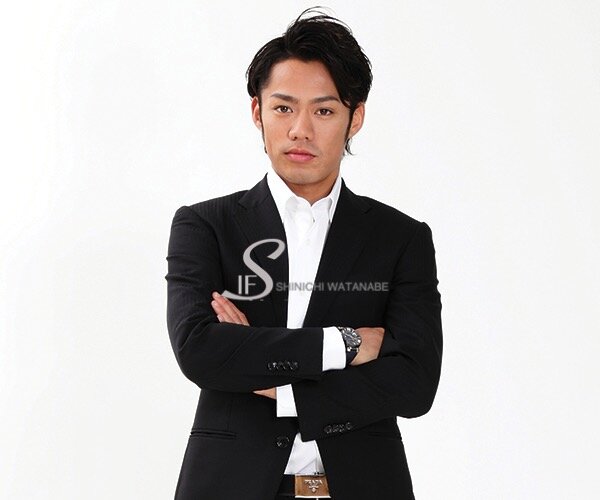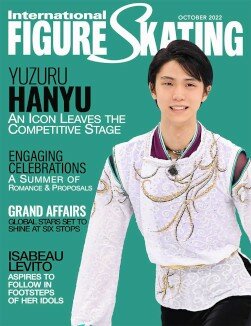

(This article was originally published in the IFS October 2010 issue)
Daisuke Takahashi did not think life could get any better after capturing the bronze medal at the 2010 Olympic Winter Games in February.
But a month later, the Japanese superstar scored an even bigger prize when he claimed his first World crown in Torino, Italy. It was a magical moment for Takahashi and one he thought might never happen. The historical achievement meant far more than winning a gold medal and having the honor of claiming the first global crown for Japan in men’s figure skating.
As the gold medal was placed around his neck the 24-year-old Kurashiki native reflected on everything that had brought him to that point. It was the exclamation mark on his triumph over so many obstacles to reach the highest pinnacle of his sport.
COURAGEOUS COMEBACK
It had been a long and often difficult road for Takahashi since he tore the anterior cruciate ligament and medial meniscus in his right knee during a training session in October 2008. The injury required surgery and a screw was inserted into his knee, forcing him to sit out the entire pre-Olympic season.
There were many times when he questioned whether he would ever be able to return to the ice and the sport he loves so much. “It was hard to adjust to my feelings after my knee injury,” the 2007 World silver medalist admitted. “For a long time, I did not know if I would be able to compete at the Olympic Games.”
When Takahashi returned to the ice on April 4, 2009, to begin preparing for the 2010 season he turned to Shizuka Arakawa, the 2006 Olympic champion. “Before the Games in Vancouver I trained with Shizuka and I learned a lot from her about how she spent her time in Torino,” he said. “I spent almost all of my time with her so I understood what to expect long before I went to Vancouver. I knew that with all the support I had around me I could perform on the Olympic ice.”
HISTORICAL STEP
Heading into the 2010 Olympic Winter Games Takahashi was looking to make a quantum leap over his eighth-place finish in Torino four years earlier. He arrived in Canada well in advance of the Games to train. “I knew I needed to recover from jet lag so I went to Vancouver at the end of January,” he said. “I trained at a rink in Burnaby, which was great because I was really able concentrate on my practices. It was my second Olympics and I wanted to enjoy every moment.”
The short program set the bar in the men’s event. Takahashi, skating 17th in a field of 30, nailed every element in his “Eye” by Coba routine, and landed in third place. “I was satisfied with my result after the short program. I think I skated really well,” he said. “There were lot of fans and many Japanese flags in the arena, so that was really good. I was so happy that I was at the Games.”
As he took to the ice for the free skate there was no doubt Takahashi was feeling the pressure. He missed the quad toe loop early in the program, but rallied back to nail seven clean triple jumps in his entertaining “La Strada” routine. His score of 156.98 was a season’s best.
No Japanese man had ever won an Olympic figure skating medal of any color in the history of the sport and when the scores were announced, Takahashi could not control his emotions as he realized he had claimed the bronze medal. “I was so happy I was in tears. I am not normally like that,” he said. “The Olympics are very special. I saw the same faces at the venue that I see at other competitions, but the atmosphere was totally different. There was a lot of pressure on everyone so I am very proud that I did my best under those conditions.”
Standing on the Olympic podium was an emotional experience the 24-year-old said. “That feeling was something I never felt before. I was thinking about all of the time I had invested to get onto that podium and all the people who had helped me realize that dream.”
The historical moment sent the media into overdrive with every Japanese outlet clamoring to interview him. “It was exhausting in so many ways,” Takahashi admitted. “But after I did the full media tour I went to dinner with my team and had a couple of beers.”
Unable to participate in the opening ceremony because of his training schedule, Takahashi reveled in the opportunity to march in the closing ceremony. “It was so much fun spending time with the Japanese team,” he said. “It was a great memory in my lifetime. I enjoyed every moment.”
His return to Japan produced more surprises. “I was happy to bring home a medal and many people celebrated my success,” he recalled. “My hometown had a parade for me. This was the first time anything like that had ever happened to me.”
ON TOP OF THE WORLD
Takahashi admitted that regrouping for the World Championships three weeks later was a challenge. “My condition was not that good before Worlds. It was hard to find the motivation because I had invested so much energy, both physically and mentally, in the Olympics. A couple of days before my planned departure to Torino I was thinking that I would withdraw, but then I decided to concentrate on what I could achieve at that competition.”
Takahashi dominated the men’s event in Italy with two stunning performances. A strong short put him into first place, a couple of points ahead of Canada’s Patrick Chan, but it was his performance in the long that rocked the Palavela arena. Skating with total abandon, Takahashi, the last skater of the event, opened his program with a quad flip, a jump never before attempted in international competition. Though he two-footed the landing, it set the pace for the rest of the program. Totally relaxed and into his knees, he reeled off a series of jumping passes that were highlighted by an artistry and playfulness the Japanese superstar had never previously shared with the world. His performance was captivating. As the last note of the music faded, the sold-out crowd rose to its feet in a wild standing ovation.
“At that moment I felt so great,” Takahashi said. When the final results flashed on the overhead scoreboard, the crowd once again rose to its feet in a deafening roar. Takahashi, who could not contain his elation, pumped his fists in the air one moment and bowed to the audience the next.
He claimed the gold with a free skate score of 168.40, a season high, and a combined total of 257.70, more than 10 points over his nearest rival. It was another historical milestone for the Japanese star. “I knew I had a good chance to win, but it was still a big step for me, regardless of who wasn’t there,” he said in reference to Evan Lysacek and Evgeni Plushenko, the 2010 Olympic gold and silver medalists, who skipped the global competition.
Takahashi said the reaction of his coach, Utako Nagamitsu, was subdued. “I think this was because she was not satisfied with my technical performances, but she was happy with the result and said I did a great job,” he recalled.
“Daisuke’s victory was a big step forward for Japanese men’s skating,” said 2002 World bronze medalist Takeshi Honda, who is Takahashi’s jumping coach. “I was very happy for him because I see him train so hard every day.”
Takahashi’s performance was an inspiration for Chan who claimed silver. “To see the way he performed … and that was the only difference, to be honest,” Chan said. “It was not what he did technically. It was the level of performance and the confidence that he skated with that was so amazing.”
NEW CHAPTERS UNFOLD
Takahashi said the reception he received when he returned home from Italy was unexpected. “I did not realize it when I was in Torino, but my victory was bigger news in Japan than I thought. I was very surprised about that.”
However, he had little time to savor his historical win before hitting the show circuit, performing in Nagoya, Osaka, Tokyo and Yokohama. “I skated my short program and a shortened version of my free as well as an exhibition program ‘Luv Letter.’ I hope people enjoyed them. I skated with my heart to show that I appreciate everyone for all the support I have received,” Takahashi said.
On a personal level, not much in his life has changed. “However, people now recognize me when I walk down the street and sometimes they congratulate me,” he said with a slight smile. “I had an opportunity to meet the Emperor and Empress of Japan at a garden party. That does not happen without the medals.” When asked how much his fan base has expanded in the past few months, Takahashi was modest in his response. “I can’t say how much. I read fan mail in between shows and whenever I can.”
In May, Takahashi took two vacations — one in Okinawa and the other in Hawaii. “I think skaters like warm places,” he said. “I invited my coach to go to Hawaii. Even though it was a short holiday, I hope she enjoyed it because I enjoyed it very much.”
Throughout last season, rumors swirled that Takahashi planned to retire at the end of the 2009-2010 season. He conceded that it was true — he had intended to leave the amateur circuit, but has since reconsidered. “When I returned home from Worlds people asked me whether I would aim to compete at the 2014 Olympics,” he said. “I thought I would finish my career after the Vancouver Games but after the Olympics I felt that my conditioning was getting back to what it used to be, so I have decided to continue as an eligible skater.”
He plans to take it one season at a time, but has committed to compete at the World Championships in his homeland in 2011 and is “already thinking about a gold medal at next year’s Championships in Tokyo.” Takahashi has also decided to delay surgery to remove the screw in his right knee until next spring.
In early June, he went to the U.S. to start working on a new long program with choreographer Pasquale Camerlengo. “I am looking forward to making a new program with him. As for the short program, I have asked a couple of other choreographers to design programs for me. I want to try something new while I am still an eligible skater,” said Takahashi.
He turned to Stéphane Lambiel to craft a new short program. “Stéphane is one of the great people who will work with Daisuke in his future career,” Takahashi’s agent, Tak Ihara, confirmed.
Takahashi said he is so grateful to all the peo ple who believed in him the past two years. “I know this could never have happened without the support of my coach, my trainer and all the other people who are part of my team.” “And also thank you to all of the fans who cheered for me in Vancouver and Italy. I am so happy that my skating brought happiness to so many people last season. I hope I can show you all even better performances next year.”
RELATED CONTENT: Yuna Kim Riding a Golden Wave




